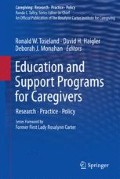Abstract
One consequence of living longer in the twenty-first century is that most Americans will become caregivers to either their spouses or their parents, if not both. Caregiving is a genuine act of kindness to those whose lives influence our own and to whom we feel a personal sense of obligation. Although there is not a formal contractual obligation for caregiving, the bonds of filial and marital responsibility often run deep. Many individuals feel a strong moral obligation for giving care throughout the lifespan. However, the rationale for caregiving varies widely among individuals and families, whose expectations and needs often determine the extent of the perceived or actual obligation. Whether motivated by obligation or kindness, the demands of providing care to someone who is frail have considerable physical, psychological, and financial consequences for the caregiver. Supportive social and educational programs have emerged in the past two decades to help individuals and families understand and more effectively assume their caregiving responsibilities. These programs have developed in response to the burgeoning needs expressed by caregivers for information and strategies to help them to become more effective, and less overwhelmed, in their caregiving roles. In this book, we examine research findings that illuminate the efficacy of supportive and educational interventions for family caregivers.
Access this chapter
Tax calculation will be finalised at checkout
Purchases are for personal use only
References
Administration on Aging. (2004). Compassion in action. Washington: United States Department of Health and Human Services.
Arno, P., Levine, C., & Memmott, M. M. (1999). Economic value of informal caregiving. Health Affairs, 18(2), 182–188.
Biegel, D., & Schulz, R. (1999). Caregiving and caregiver interventions in aging and mental illness. Family Relations, 48(4), 345–355.
Cantor, M. (1991). Family and community: Changing roles in an aging society. The Gerontologist, 31(3), 337–346.
Caregiving in the U.S. (2004). National alliance for caregiving (Bethesda) and AARP (Washington). Funded by MetLife Foundation. Bethesda: National Alliance for Caregiving.
Caregiving in the U.S. (2005). National alliance for caregiving (Bethesda) and AARP (Washington). Funded by Metlife. Bethesda: National Alliance for Caregiving.
Caregiving in the U.S. (2009). National alliance for caregiving (Bethesda), and AARP (Washington). Funded by Metlife. Bethesda: National Alliance for Caregiving.
Evercare (United Health Care) and National Alliance for Caregiving (NAC). (2009). The Evercare Survey of the Economic Downturn and its Impact on Family Caregiving. Bethesda: Minnetonka.
Federal Interagency Forum on Aging-Related Statistics (2004). Older Americans 2004: Key Indicators of Well-Being. Retrieved from the Federal Interagency Forum on Aging-Related Statistics: http://www.agingstats.gov/agingstatsdotnet/main_site/default.aspx
Federal Interagency Forum on Aging-Related Statistics (2006). Older Americans 2006: Key Indicators of Well-Being. Retrieved from the Federal Interagency Forum on Aging-Related Statistics: http://www.agingstats.gov/agingstatsdotnet/main_site/default.aspx
Federal Interagency Forum on Aging-Related Statistics. (2008). Older Americans update 2008: Key indicators of well-being. Federal Interagency Forum on Aging-Related Statistics. Washington: Government Printing Office.
Feinberg, L. F., Wolkwitz, K., & Goldstein, C. (2006). Ahead of the curve: Emerging trends and practices in family caregiver support. Washington: Family Caregiver Alliance and AARP.
Kane, R. A., & Penrod, J. D. (1995). Family caregiving in an aging society: Policy perspectives. Thousand Oaks: Sage.
Lazarus, R., & Folkman, S. (1984). Stress, appraisal and coping. New York: Springer.
Markides, K., & Miranda, M. (1997). Minority aging and health: An overview. In K. S. Markides & M. R. Miranda (Eds.), Minorities, aging, and health (pp. 1–14). Thousand Oaks: Sage Publishers.
McCubbin, H. M., McCubbin, M., & Thompson, A. (1993). Resiliency in families: The role of family schema and appraisals in family adaptation to crises. In T. H. Brubaker (Ed.), Family relations: Challenges for the future (pp. 153–177). Newbury Park, CA: Sage Publishers.
Olshansky, S. J., Goldman, D. P., Zheng, Y., & Rowe, J. W. (2009). Aging in America in twenty-first century: Demographic forecasts from the MacArthur foundation research network on an aging society. The Milbank Quarterly, 87(4), 842–862.
Pruchno, R., Patrick, H., & Burant, C. (1997). African-American and white mothers of adults with chronic disabilities: Caregiving burden and satisfaction. Family Relations, 46(4), 335–346.
Spillman, B. C., & Black, K. J. (2005). Staying the course: Trends in family caregiving. Washington: The Urban Institute and AARP.
Toseland, R., & McCallion, P. (1997). Trends in Caregiving Intervention Research. Social Work Research, 21(3), 154–164.
Toseland, R. W., & Smith, T. (2001). Supporting caregivers through education and training. Washington: U.S. Administration on Aging and U.S. Department of Health and Human Services.
Vladeck, B. C. (2005). Economic and policy implications of improving longevity. Journal of the American Geriatrics Society, 53(9), S304–S307.
Walsh, F. (1996). The concept of family resilience: Crisis and challenge. Family Process, 35, 261–281.
Author information
Authors and Affiliations
Corresponding author
Editor information
Editors and Affiliations
Rights and permissions
Copyright information
© 2011 Springer Science+Business Media, LLC
About this chapter
Cite this chapter
Monahan, D.J., Haigler, D.H., Toseland, R.W. (2011). Introduction. In: Toseland, R., Haigler, D., Monahan, D. (eds) Education and Support Programs for Caregivers. Caregiving: Research, Practice, Policy. Springer, New York, NY. https://doi.org/10.1007/978-1-4419-8031-1_1
Download citation
DOI: https://doi.org/10.1007/978-1-4419-8031-1_1
Published:
Publisher Name: Springer, New York, NY
Print ISBN: 978-1-4419-8030-4
Online ISBN: 978-1-4419-8031-1
eBook Packages: Behavioral ScienceBehavioral Science and Psychology (R0)

